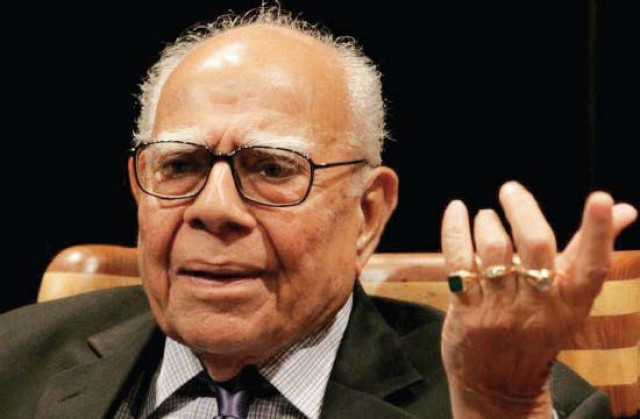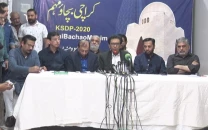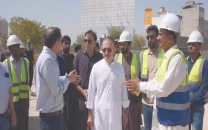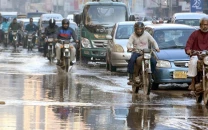‘The greatest success of terrorists is if a country gives up rule of law’
Indian lawyer Ram Jethmalani on terrorism and constitution.

‘The greatest success of terrorists is if a country gives up rule of law’
Lawyer Ram Jethmalani is like no other nonagenarian. As all good flirts, he’s charming, witty and irrepressible in equal measure. But it’s not quite what one would expect from a man who’s defended in court Indira Gandhi’s assassin Balbir Singh, smuggler-gangster Haji Mastan, model Jessica Lal’s murderer Mannu Sharma as well as Professor Abdul Rehman Geelani, who was accused of helping plan the attack on the Indian Parliament in 2001.
Securing an invite to the Sindh High Court Bar Association dinner he was attending was easy; wresting him from a bunch of lawyers debating fine legal points is more difficult. Among the conservatively attired Karachi set, Jethmalani was the peacock. With a maroon Hawaiian-print shirt, a yellow silk handkerchief and chunky rings, the black jacket was just a nod at formal attire. But switching between fluent English, Urdu and Sindhi, the Shikarpur-born Jethmalani effortlessly worked the crowd, reminescing about his hometown, his impressions of President Asif Zardari, Pak-India relations and how ice cream is the perfect antidote to alcohol. It was gone midnight by the time he settled down for a chit chat. And despite the strain of travelling all day and being booked on an early morning flight to Mumbai, Jethmalani was in fine form. Excerpts.
Q. You’ve defended a host of people few others would have touched. Where does this impulse stem from?
A. It’s a question of following the basic rules of the profession. It’s a recognised rule among English barristers that when a lawyer refuses to stand between the Crown and the subject, it’s the end of liberty. In accordance with that, there’s a statutory rule in India that no lawyer can refuse [a brief] because he either believes the client is guilty or the lawyer fears he’ll be going against public opinion and representing that client will make him unpopular. If I hadn’t represented [all those I did], I wouldn’t have been true to my profession.
I didn’t earn a pai in the Gandhi case. I was a member of the BJP; the party asked me to resign because I had accepted the brief and so I did. But I had to do it because of my professional obligations.
Our constitution guarantees every citizen the right to a counsel and the courts try and accommodate the requests of the accused for a lawyer of their choice. It’s a tradition at the bar to treat the wish of a death row prisoner as a command.
Q. But what about those accused of crimes such as terrorism? You have now Ajmal Kasab; we’ve had our experience with Hafiz Saeed…
A. Yes, but also remember that Professor Geelani was sentenced to death in the Parliament case and he was subsequently acquitted. The greatest success of terrorists will be when India gives up [adherence to] rule of law; we will have become terrorists then.
Q. What do you make of the current trend of judicial activism in Pakistan, in light of the Indian experience?
A. I’m not too familiar with the details of the Pakistani experience but generally, the judiciary should be on the side of the citizen. The executive, because it’s arrogant or corrupt, does tend to assail the rights of citizens, and the judiciary is support to protect these rights. So there should be tension between the judiciary and the executive.
In India, it was observed that people couldn’t approach the courts for redressal of their problems because of economic backwardness so the scope of locus standi was widened; now any civic-minded person can petition the court on behalf [of the dispossessed]. It’s a healthy principle, as long as it’s not misused for propaganda or political purposes.
As for Pakistan in particular, the Bar has done a great job in bringing back democracy and establishing the independence of the judicary. But it’s a fragile democracy and needs to be propped up and this is something India can help with. In India, people have problems with Pakistani military dictators; it’s in India’s interest that democracy in Pakistan is supported.
Published in The Express Tribune, April 27th, 2011.



















COMMENTS
Comments are moderated and generally will be posted if they are on-topic and not abusive.
For more information, please see our Comments FAQ